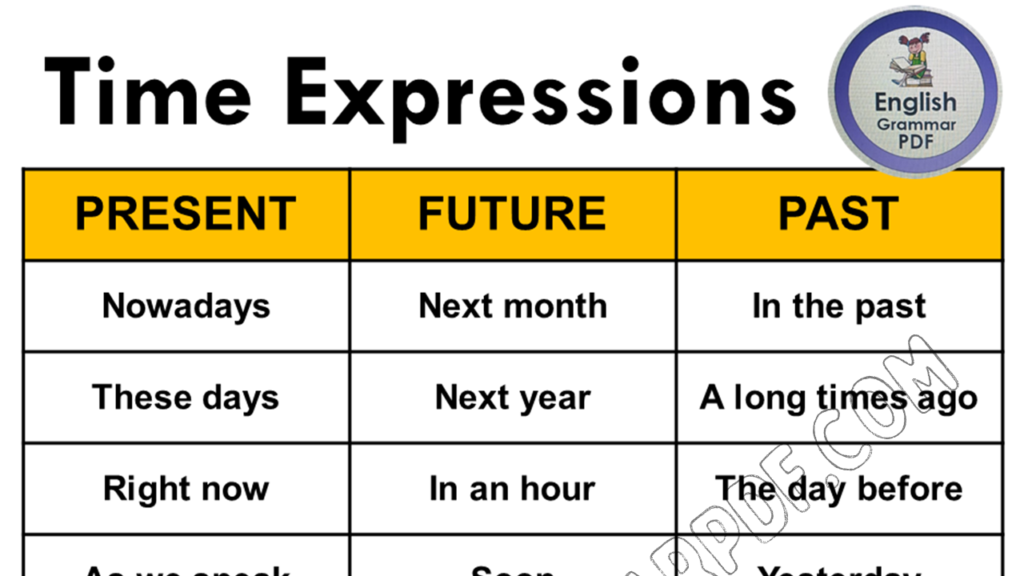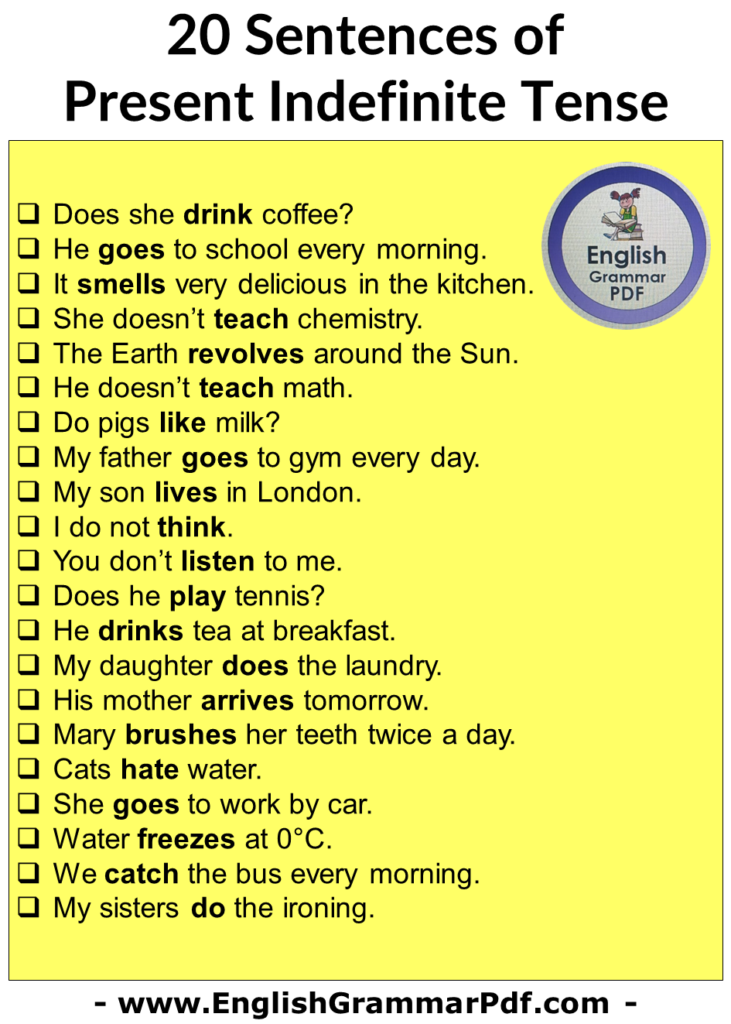Learning tenses is an obvious problem that beginners gonna face but keep in mind that the perfect way to learn tenses is to memorize the tense structure and then practice it in examples.
The structure of tenses in English grammar is a fundamental and complex aspect of language. It involves understanding the different forms of verbs and how they change to indicate time, aspect, and mood. Tenses are not solely determined by adding auxiliary verbs or endings; they also rely on the context and intention behind the communication.
Below we have explained the structures of every class of tenses with detailed examples of affirmatives, negative, and interrogative.
Structure of Tenses in English Grammar with Examples
Here we’ll explore all tenses, each with its unique structure and examples;
Present Tense
This tense describes actions or conditions that are currently happening or are generally true. It also covers habitual or repeated actions.
Present Simple/Indefinite Tense
Structure:
- Affirmative: —— Subject. + V1(s/es) + Object.
- Negative: ——– Subject. + Do not/Does not + V1 + Object.
- Interrogative: ——— Do/Does + Subject. + V1 + Object. + ?
Examples:
| AFFIRMATIVE (+) | NEGATIVE (-) | INTERROGATIVE (?) |
| I stand | I do not stand | Do I stand? |
| You stand | You do stand | Do you stand? |
| He stands | He does stand | Does he stand? |
| She stands | She does stand | Does she stand? |
| It stands | It does stand | Does it stand? |
| We stand | We do stand | Do we stand? |
| They stand | They do stand | Do they stand? |
Present Continuous Tense
Structure:
- Affirmative: —— Subject. + is/are/am + V(ing) + Object..
- Negative: ——– Subject. + (Is, are, am) Not + V(ing) + Object.
- (?)——— is/are/am + Subject. + V(ing) + Object.. + ?
Examples:
| AFFIRMATIVE (+) | NEGATIVE (-) | INTERROGATIVE (?) |
| I am taking Tea. | I am taking Tea. | Am I taking tea? |
| You are taking Tea. | You are not taking Tea. | Are you taking tea? |
| He is taking Tea. | He is not taking Tea. | Is he taking tea? |
| She is taking Tea. | She is not taking Tea. | Is she taking tea? |
| It is taking Tea. | It is not taking Tea. | Is it taking tea? |
| We are taking Tea. | We are not taking Tea. | Are we taking tea? |
| They are taking Tea. | They are not taking Tea. | Are they taking tea? |
Present Perfect Tense
Structure:
- Affirmative: —— Subject. + Has/Have + V3 + Object..
- Negative: ——– Subject. + (Has/Have) not + V3 + Object.
- (?)——— Has/Have + Subject. + V3 + Object.. + ?
Examples:
| AFFIRMATIVE (+) | NEGATIVE (-) | INTERROGATIVE (?) |
| I have Played. | I have not Played. | Have I Played? |
| We have Played. | We have not Played. | Have we Played? |
| They have Played. | They have not Played. | Have they Played? |
| You have Played. | You have not Played. | Have you Played? |
| He has Played. | He has not Played. | Has he Played? |
| She has Played. | She has not Played. | Has she Played? |
| Adam has Played. | Adam has not Played. | Has Adam Played? |
Present Perfect Continuous Tense
Structure:
- Affirmative: —— Subject. + (Has/Have) been + V(ing) + Object..
- Negative: ——– Subject. + (Has been/Have been) not + V(ing) + Object.
- Interrogative: ——— Has/Have + Subject. + been + V(ing) + Object.. + ?
Examples:
| AFFIRMATIVE (+) | NEGATIVE (-) | INTERROGATIVE (?) |
| He has been playing. | He has not been Playing. | Has he been Playing? |
| She has been Playing. | She has not been Playing. | Has she been Playing? |
| It has been Playing. | It has not been Playing. | Has it been Playing? |
| I have been playing. | I have not been Playing. | Have I been Playing? |
| We have been playing. | We have not been Playing. | Have we been Playing? |
| You have been Playing. | You have not been Playing. | Have you been Playing? |
| They have been Playing. | They have not been Playing. | Have they been Playing? |
Explore: Chart of All Tenses
Past Tense
This tense is used to describe actions or situations that occurred at a specific time in the past and are no longer happening.
Simple Past Tense
Structure:
- Affirmative: —— Subject. + V2 + Object..
- Negative: ——– Subject. + Did not + V1 + Object.
- Interrogative: ——— Did + Subject. + V1 + Object.. + ?
Examples:
| AFFIRMATIVE (+) | NEGATIVE (-) | INTERROGATIVE (?) |
| I ran | I did not stand | Did I stand? |
| You ran | You did not stand | Did you stand? |
| He ran | He did not stand | Did he stand? |
| She ran | She did not stand | Did she stand? |
| It ran | It did not stand | Did it stand? |
| We ran | We did not stand | Did we stand? |
| They ran | They did not stand | Did they stand? |
Past Continuous Tense
Structure:
- Affirmative: —— Subject. + was/were + V(ing) + Object..
- Negative: ——– Subject. + (was/were) Not + V(ing) + Object.
- Interrogative: ——— was/were + Subject. + V(ing) + Object.. + ?
Examples:
| AFFIRMATIVE (+) | NEGATIVE (-) | INTERROGATIVE (?) |
| I was playing cricket. | I was playing cricket. | Was I playing cricket? |
| You were playing cricket. | You were not playing cricket. | Were you playing cricket? |
| He was playing cricket. | He was not playing cricket. | Was he playing cricket? |
| She was playing cricket. | She was not playing cricket. | Was she playing cricket? |
| It was playing cricket. | It was not playing cricket. | Was it playing cricket? |
| We were playing cricket. | We were not playing cricket. | Were we playing cricket? |
| They were playing cricket. | They were not playing cricket. | Were they playing cricket? |
Past Perfect Tense
Structure:
- Affirmative: —— Subject. + had + V3 + Object..
- Negative: ——– Subject. + had not + V3 + Object.
- Interrogative: ——— had + Subject. + V3 + Object.. + ?
Examples:
| AFFIRMATIVE (+) | NEGATIVE (-) | INTERROGATIVE (?) |
| I had Laughed. | I had not Laughed. | Had I Laughed? |
| We had Laughed. | We had not Laughed. | Had we Laughed? |
| They had Laughed. | They had not Laughed. | Had they Laughed? |
| You had Laughed. | You had not Laughed. | Had you Laughed? |
| He had Laughed. | He had not Laughed. | Had he Laughed? |
| She had Laughed. | She had not Laughed. | Had she Laughed? |
| It had Laughed. | It had not Laughed. | Had it Laughed? |
Must Learn: Parts of Speech in English
Past perfect continuous Tense
Structure:
- Affirmative: —— Subject. + had been + Verb(ing) + Object..
- Negative: ——– Subject. + had not + Verb(ing) + Object.
- Interrogative: ——— had + Subject. + been + Verb(ing) + Object.. + ?
Examples:
| AFFIRMATIVE (+) | NEGATIVE (-) | INTERROGATIVE (?) |
| He had been laughing. | He had not been laughing. | Had he been laughing? |
| She had been laughing. | She had not been laughing. | Had she been laughing? |
| It had been laughing. | It had not been laughing. | Had it been laughing? |
| I had been laughing. | I had not been laughing. | Had I been laughing? |
| We had been laughing. | We had not been laughing. | Had we been laughing? |
| You had been laughing. | You had not been laughing. | Had you been laughing? |
| They had been laughing. | They had not been laughing. | Had they been laughing? |
Future Simple Tense
Structure:
- Affirmative: —— Subject. + will/shall + V1+ Object..
- Negative: ——– Subject. + (will/shall) not + V1 + Object.
- Interrogative: ——— will/shall + Subject. + V1 + Object.. + ?
Examples:
| AFFIRMATIVE (+) | NEGATIVE (-) | INTERROGATIVE (?) |
| I will stand | I will not stand | Will I stand? |
| You will stand | You will not stand | Will you stand? |
| He will stands | He will not stands | Will he stands? |
| She will stands | She will not stands | Will she stands? |
| It will stands | It will not stands | Will it stands? |
| We will stand | We will not stand | Will we stand? |
| They will stand | They will not stand | Will they stand? |
Future Continuous Tense
Structure:
- Affirmative: —— Subject. + (will/shall) be + V(ing)+ Object..
- Negative: ——– Subject. + (will/shall) not + be + V(ing) + Object.
- Interrogative: ——— will/shall + Subject. + be + V(ing) + Object.. + ?
Examples:
| AFFIRMATIVE (+) | NEGATIVE (-) | INTERROGATIVE (?) |
| I will be drinking | I will not be drinking | Will I be drinking? |
| You will be drinking | You will not be drinking | Will you be drinking? |
| He will be drinking | He will not be drinking | Will, he drinking? |
| She will be drinking | She will not be drinking | Will, she drinking? |
| It will be drinking | It will not be drinking | Will, it drinking? |
| We will be drinking | We will not be drinking | Will we be drinking? |
| They will be drinking | They will not be drinking | Will they be drinking? |
Future Perfect Tense
Structure:
- Affirmative: —— Subject. + (will/shall) have + V(3) + Object..
- Negative: ——– Subject. + (will/shall) + not + have + V(3) + Object.
- Interrogative: ——— will/shall + Subject. + have + V(3) + Object.. + ?
Examples:
| AFFIRMATIVE (+) | NEGATIVE (-) | INTERROGATIVE (?) |
| I will have Accepted. | I will not have Accepted. | Will I Have Accepted? |
| We will have Accepted. | We will not have Accepted. | Will we Have Accepted? |
| They will have Accepted. | They will not have Accepted. | Will they Have Accepted? |
| You will have Accepted. | You will not have Accepted. | Will you Have Accepted? |
| He will have Accepted. | He will not have Accepted. | Will he Have Accepted? |
| She will have Accepted. | She will not have Accepted. | Will she Have Accepted? |
| It will have Accepted. | It will not have Accepted. | Will it Have Accepted? |
Future Perfect Continuous Tense
Structure:
- Affirmative: —— Subject. + (will/shall) have been + V(ing) + Object..
- Negative: ——– Subject. + (will/shall) + not + have been + V(ing) + Object.
- Interrogative: ——— will/shall + Subject. + have been + V(ing) + Object.. + ?
Examples:
| AFFIRMATIVE (+) | NEGATIVE (-) | INTERROGATIVE (?) |
| I will have been laughed. | I will not have been laughed. | Will i have been laughed? |
| We will have been laughed. | We will not have been laughed. | Will we have been laughed? |
| They will have been laughed. | They will not have been laughed. | Will they have been laughed? |
| You will have been laughed. | You will not have been laughed. | Will you have been laughed? |
| He will have been laughed. | He will not have been laughed. | Will he have been laughed? |
| She will have been laughed. | She will not have been laughed. | Will she have been laughed? |
| It will have been laughed. | It will not have been laughed. | Will it have been laughed? |
Must Learn: Conditional Sentences in English Grammar
Infographics (Structure of Tenses in English Grammar)
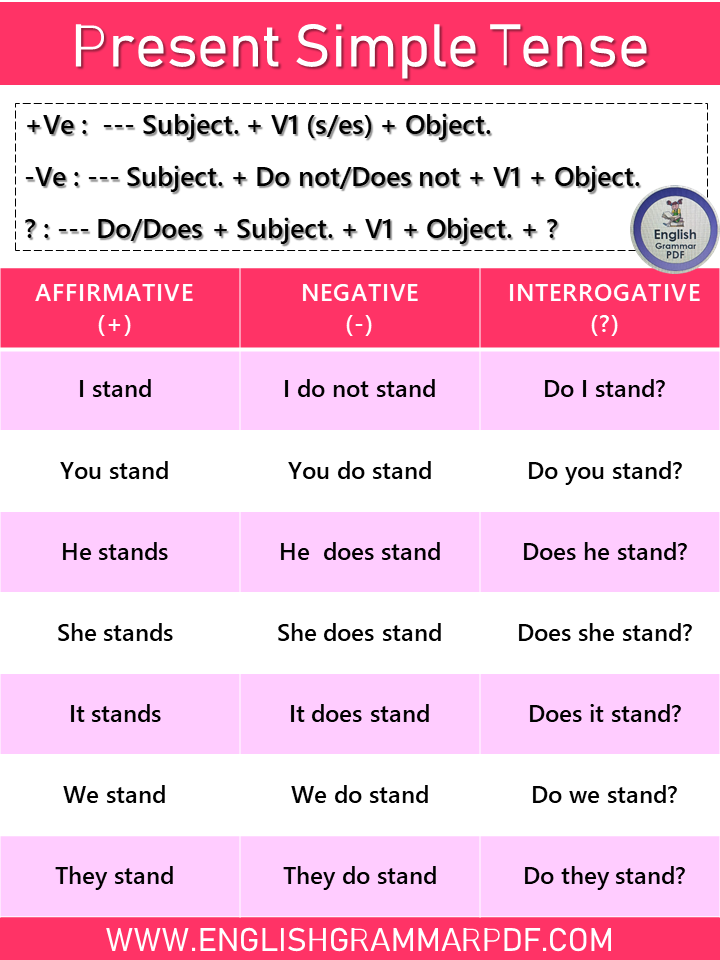
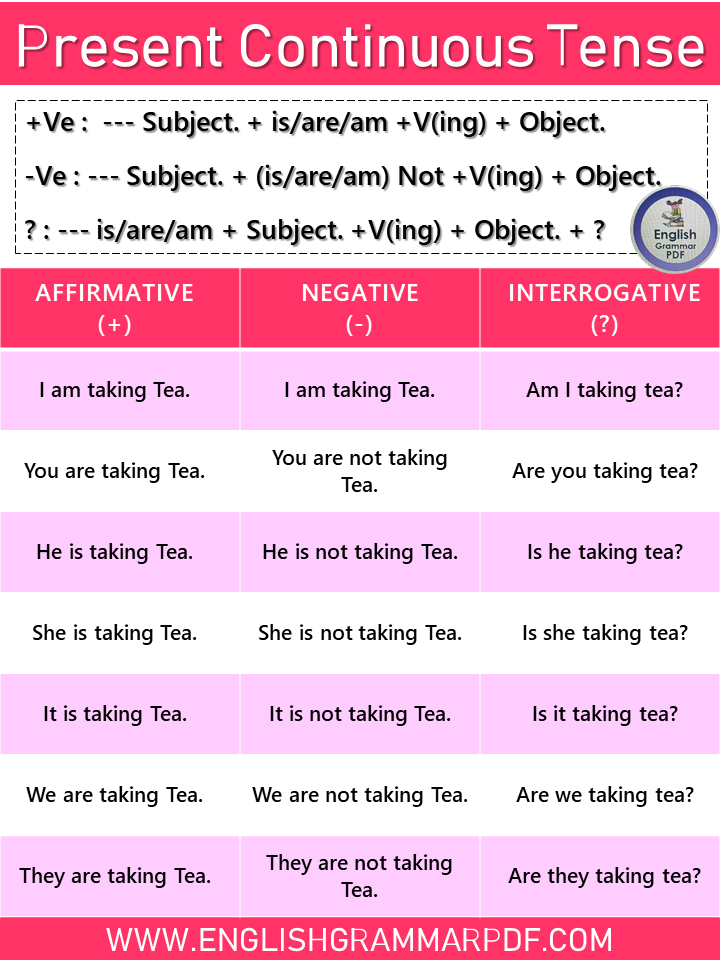
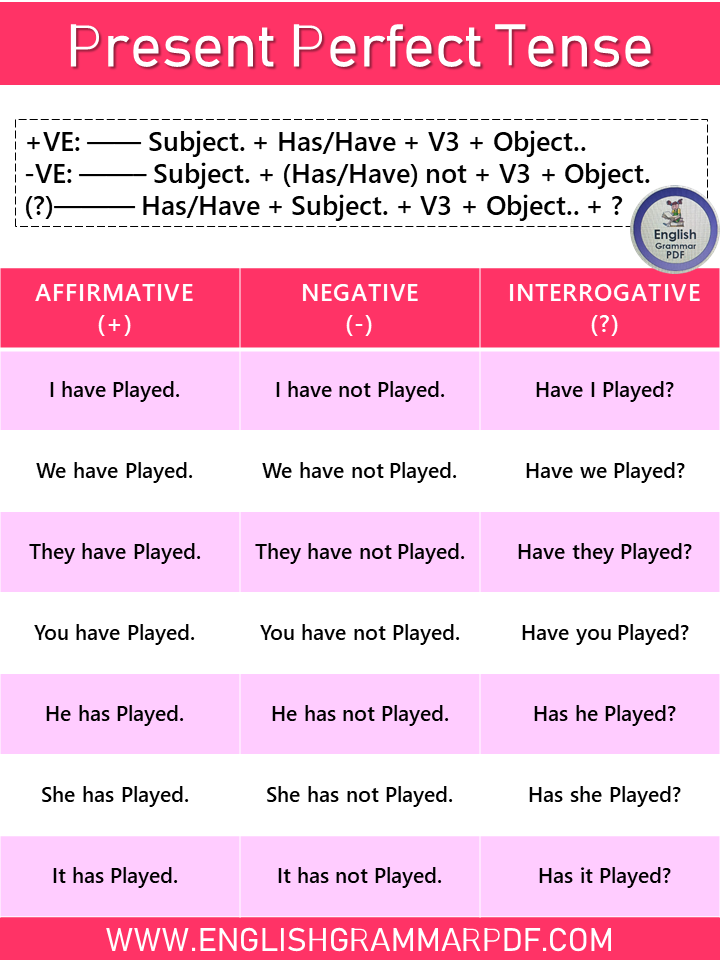
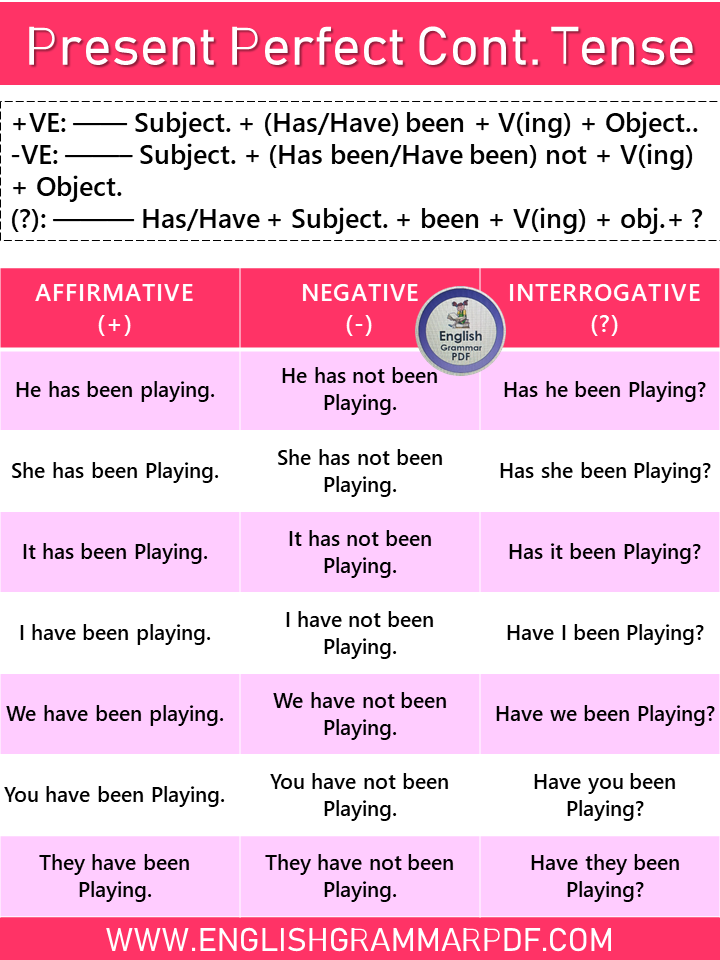
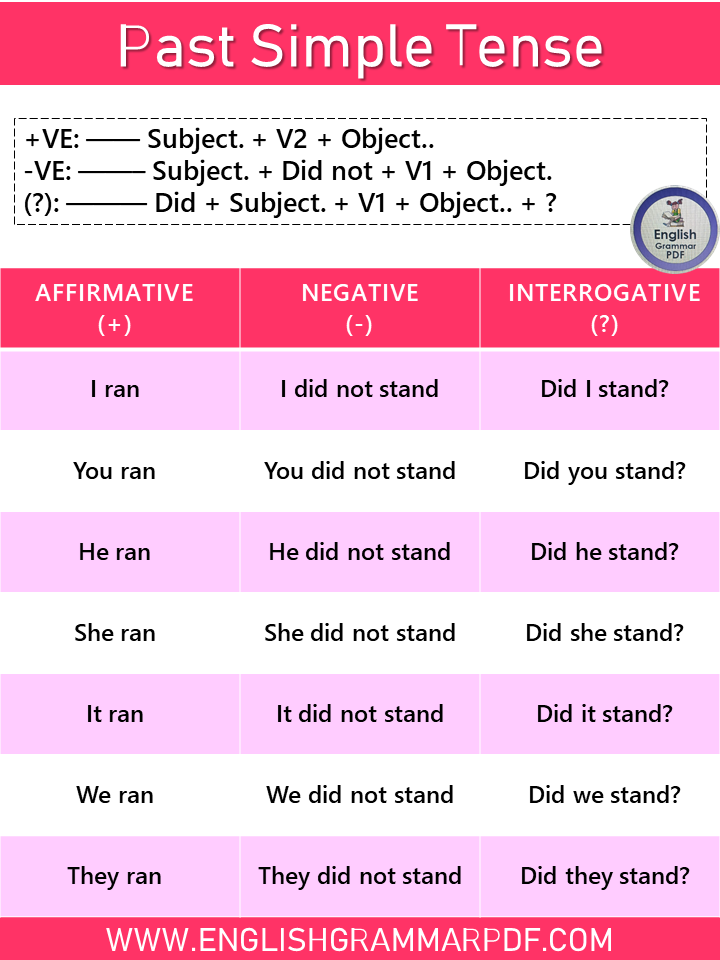
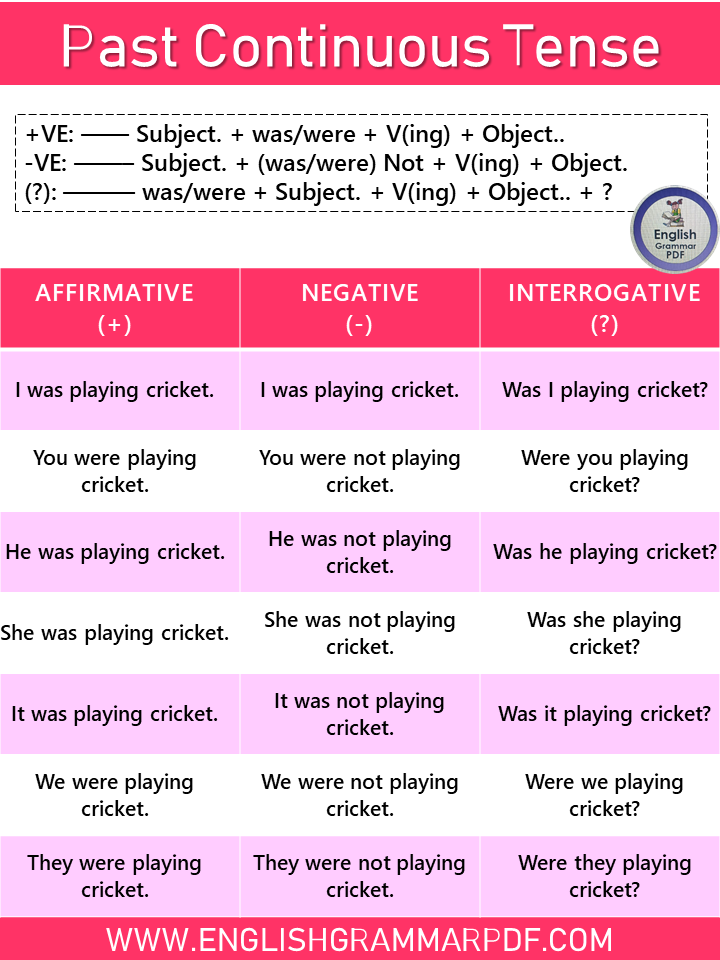
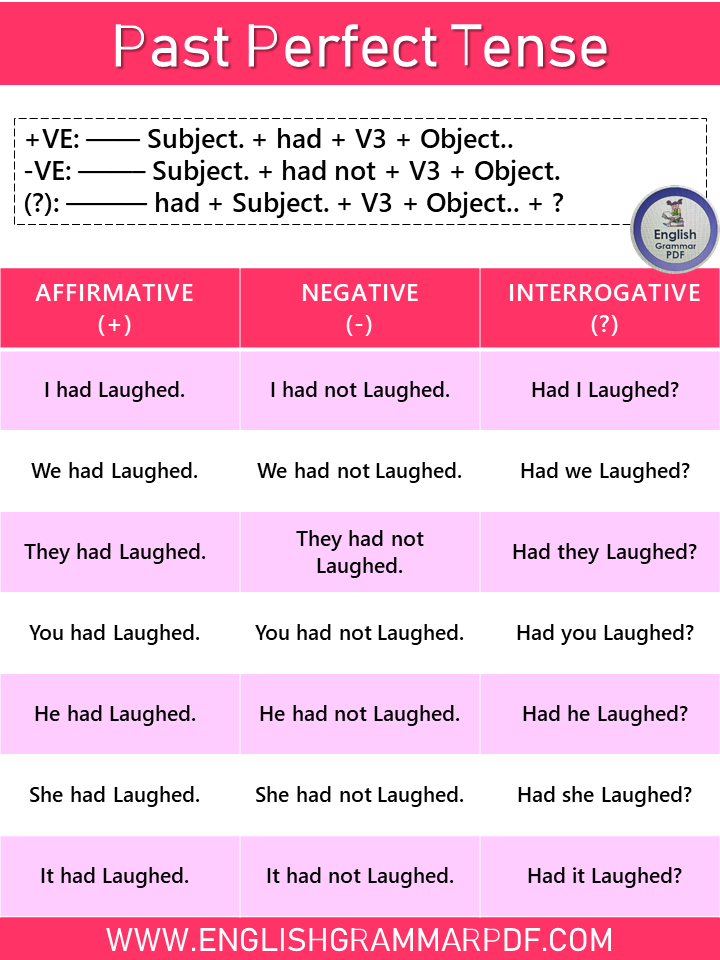
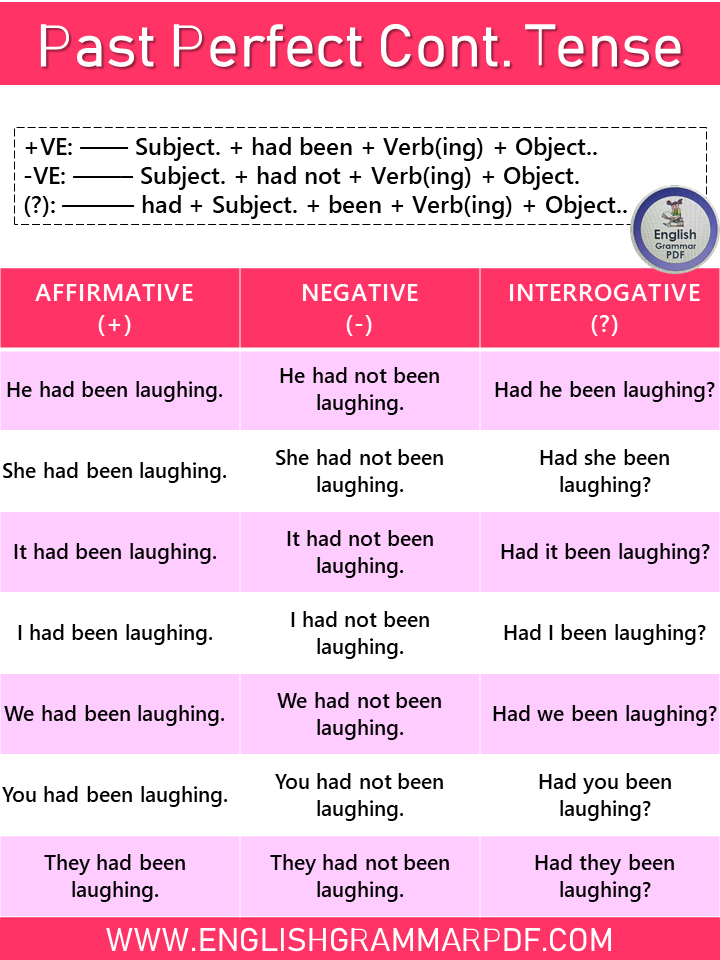
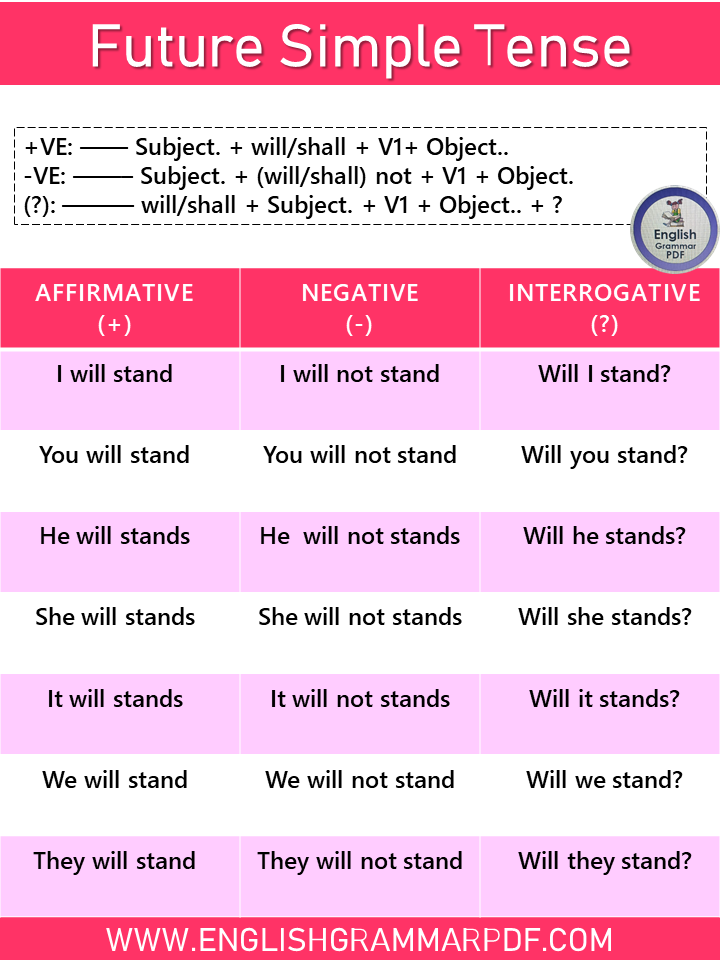
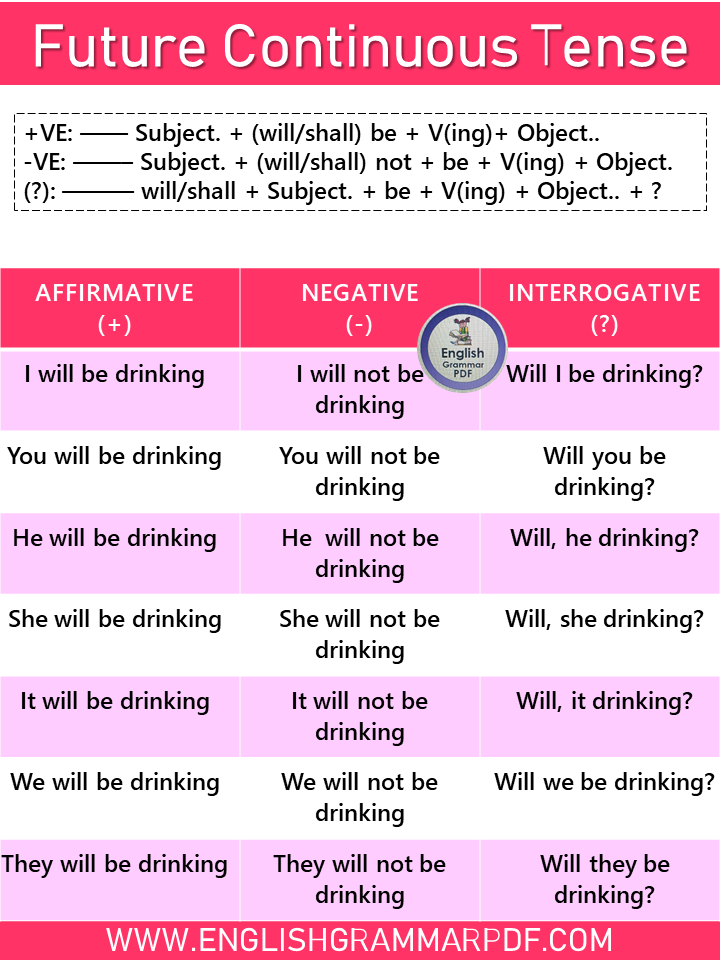
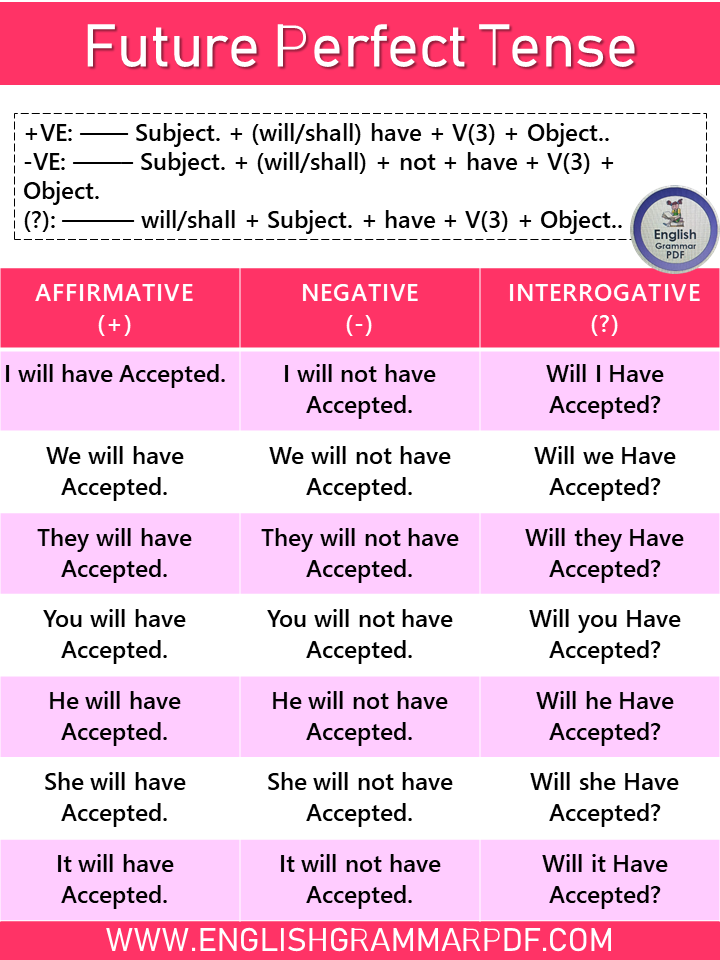
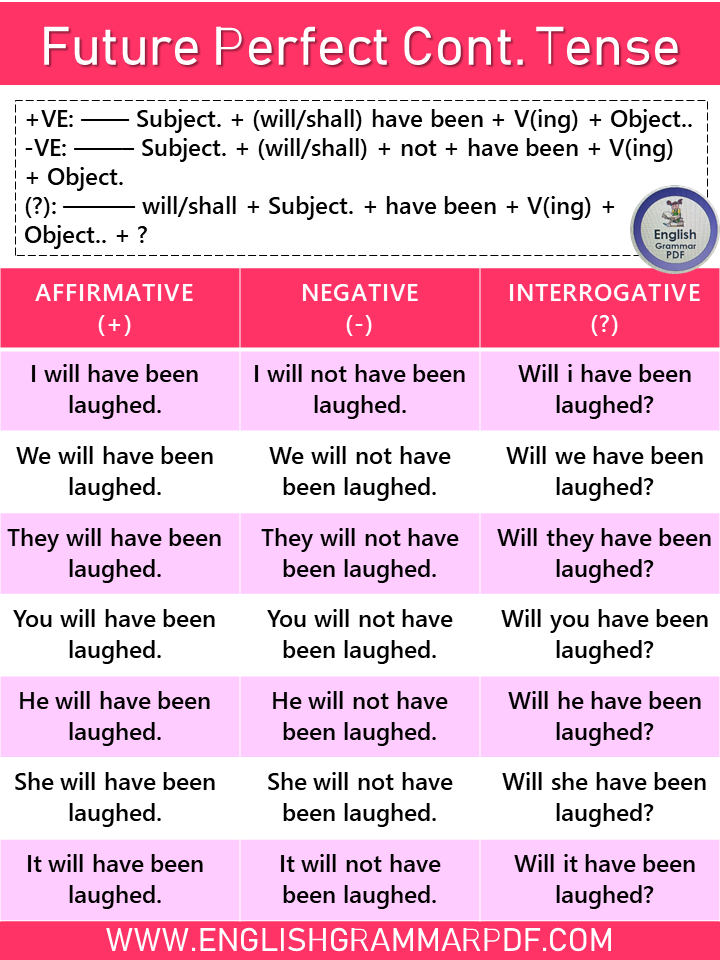
Download the Complete PDF of the Structures of all Tenses in English

